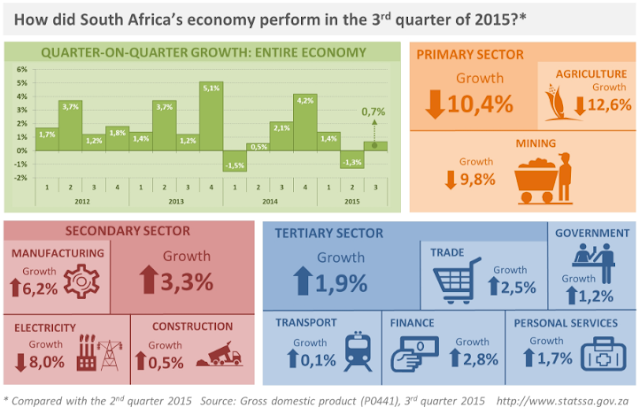As recession continues, South Africans in Limpopo, Eastern Cape in panic mood, believe the recession
As South African government
and other stakeholders continue to find solutions to the country’s recent entry
into economic recession, Infoprations
has found that people in Limpopo are fear of the future. Those reside in
Eastern Cape Province believe that the recession is real, analysis reveals.
Few
days ago, StatsSA,
South Africa’s bureau of statistics, revealed that the country’s economy shrunk
by a further 0.7%, signifying two consecutive periods of contraction, which
translates to a recession. Infoprations’
check indicates that the country was lucky not to experience recession three
years ago when the economy grew by 0.7% in the third quarter of 2015.
Report has it that agriculture, mining and electricity, gas and water supply
were the industries considered to be in recession during the quarter.
As the recession rages on, Infoprations analysis of the categories
of knowledge being sought by the South Africans and other nationals in the
countries connected with the country’s norms and values negatively. In this regard,
Infoprations discovered -5.0% reduction
in the country’s orientations in which government is expected to deal with the
situation because the citizens are powerless, individuals have to be skeptical
about the future, take care of their personal needs, connecting the present
situation with the past events and control desires and impulses.
On a positive note, Infoprations analysis shows that the
people in Limpopo, Northern Cape, Free State, Mpumalanga, Eastern Cape, Gauteng, KwaZulu-Natal,
North West and Western Cape mostly sought knowledge on the recession through
the Internet in the last 24 hours. Further analysis reveals that recession in
South Africa, South Africa, recession meaning and technical recession as
dominant specific knowledge explored by the people connected with the country’s
norms and values by 11.4%. This establishes that the knowledge resonates with
the need to know categories of stakeholders who must find the needed solutions
to the problem.
Recession meaning as a category of knowledge sought by the
people linked with the country’s orientations of people being the best in
whatever they are doing. It equally connected with the need to control their
desires and impulses, based on the way they were raised. Searching South Africa
during the 24 hours of exploring the Internet resonated with the need to take
care of personal’s needs as the recession rages on. Technical recession and recession in South
Africa were understood by the people within the orientations that they are powerless
to provide solutions to the problem, expecting government and other concerned
stakeholders to be the solution-providers while they (citizens) would continue
to examine the situation to know what the future holds for them.
Analysis also reveals that people in Limpopo were more
connected with being powerless and unknown situations. They are likely to
create beliefs and institutions that would enable them avert the severe impacts
of the outcomes of the situations. South Africans and other nationals in Northern Cape, Free
State and Mpumalanga are most likely to take care of the personal’s needs first
before helping others. For the people in Eastern Cape, the recession is real
considering 2009’s recession.
However, there is likelihood
that they would have a relatively small
propensity to save for the future, and a focus on achieving quick results.
Surprising insight from the analysis is that there is no clear link of the
people in Gauteng,
KwaZulu-Natal, North West and Western Cape with the country’s norms and values.

Comments
Post a Comment